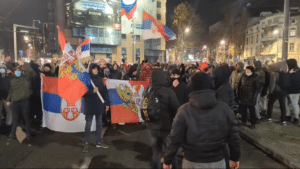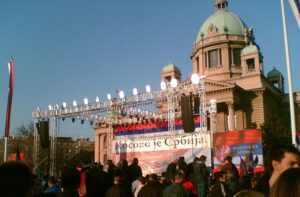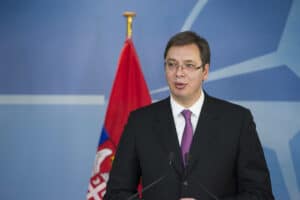Preliminary results of the parliamentary elections on 6 October show that two opposition parties triumphed over governing parties . With the left wing nationalistic Vetevendosje winning with 26% of the votes and the Democratic League of Kosovo (LDK) coming in as second with 25% of the votes. The Democratic party of Kosovo (PDk), which has governed the country for the past 12 years, came in third with 21,15 percent of the votes. While the coalition lead by former prime minister, Ramush Hardinaj, won 11,6 percent of the votes. Meanwhile, Serbian President Vucic praised the Srb List which he said claimed 90 per cent of all votes in Serb-majority municipalities in Kosovo. Key issues for voters were the deep-rooted corruption in the country and the peace talks with Serbia. A total of 1,972,466 voters were registered to cast ballots on Sunday which is a rise of around 115,000 compared to the last elections in 2017. The election was overseen by more than 34,000 independent monitors, including 100 from the European Union. In total, 21 persons were detained in relation to the elections, with charges ranging from obstruction of the voting process to misuse of voting rights.
New era
The results indicate a new era for Kosovo, whose leadership was dominated in previous years by figureheads from the countries late 1990s conflict. Like Haradinaj who resigned after he was summoned to the Criminal Tribunal in The Hague, which caused the snap elections on 6 October. Haradinaj’s party along with other parties who formed the previous “war wing “government look to be punished for their days in office. Many voters were dissatisfied with the “war wing “government which was constantly linked to corruption and intimidation. Shortly after the polls closed, Kadri Veseli, leader of the PDK, accepted defeat in the snap elections. “We didn’t win, the PDK will go into opposition and will serve the nation and state.”Veseli told reporters at a press conference.
Possible coalition
The leader of Vetevendosje, Albin Kurti, told TV station T7 that the results showed that voters had intervened to save the country from a disaster. Kurti also expressed his satisfaction over the gains made by the LDK. “Vetevendosje was the winner of the elections because it was the most voted-for party, but it is very welcoming that as the opposition together with the LDK we will have at least 60 MPs”. It is widely expected that Vetevendosje will try to form a coalition with the LDK, with both parties being critical of the coalition parties which governed the country for the past years. The leader of the LDK, Vjosa Osamni, said in an interview on the eve of the election that some politicians of the war generation had failed Kosovo citizens badly. Stating that it is time for politicians with clean hands, no links to crime and corruption to lead this country. The LDK and Vetevendosje have little overlap ideologically, and have tried to form a pre-electoral coalition. Talks between the two supposedly fell through after they couldn’t agree on the post of prime minister. A new round of talks will start shortly, but it remains to be seen whether the opposition parties can set aside their ideological differences to prevent forming a coalition with parties from the “war wing “government. For now Kurti will try to form his desired government with the LDK and maybe one smaller minority party to make it stable.
Future of Serbia talks
One of the most important subject of the elections were the peace talks with Serbia, which are expected to resume after a new government is formed. Kurti announced that his part would abolish the 100% tariffs imposed by Haradinaj’s government, this looks like a positive sign with Serbian President Vucic stating that negotiations will only start when the tariffs are abolished. Bu Kurti also announced he intends to introduce other retaliatory measures on Serbia. Some sources claim that the LDK may be flexible in regards to lifting the tariffs, although the leader of the LDK, Isa Mustafa, said in August that its party would not lift the ban on Serbian goods. A coalition between Vetevendosje and the LDK could mean that negations between Serbia and Kosovo would finally progress. With Vetevendosje hoping to address corruption but also deliver on its promise to improve the economy, pressure and incentives from the West could see Kurti make concessions in the talks with Serbia.
Sources: Euronews BalkanInsight NYtimes Euractiv



